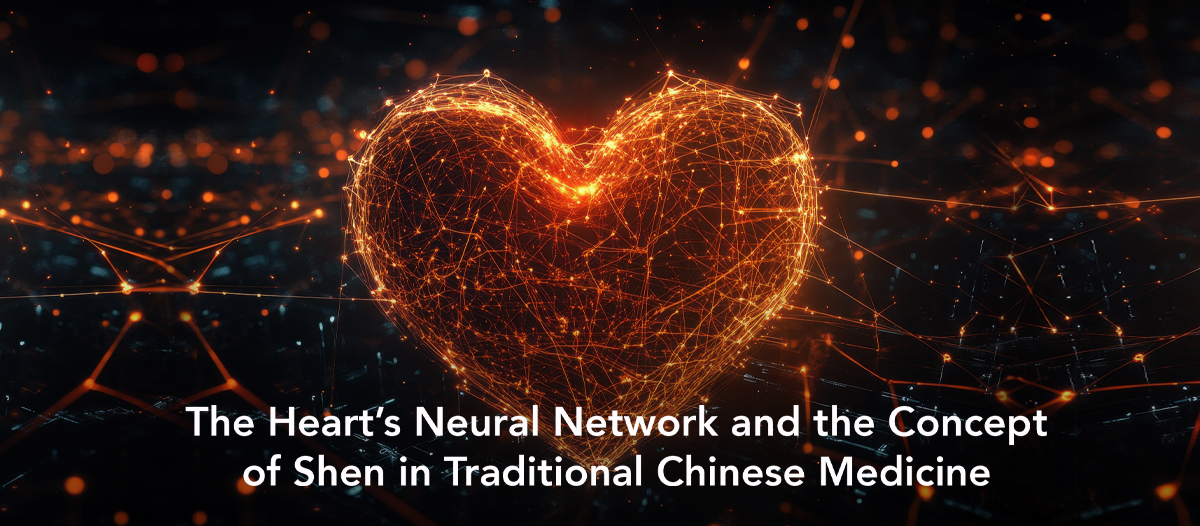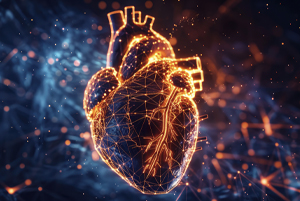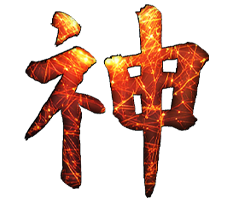The Heart’s Neural Network and the Concept of Shen in Traditional Chinese Medicine
by Mark J Kaylor
The human heart, often revered as the symbolic seat of emotions and wisdom, is far more than a mechanical pump circulating blood. Modern science reveals that the heart possesses its own neural network, known as the intrinsic cardiac nervous system or the “heart brain.” This sophisticated network, consisting of thousands of neurons, allows the heart to process information, make decisions, and communicate with the brain and other organs. Intriguingly, this scientific understanding aligns closely with the Traditional Chinese Medicine (TCM) concept of Shen, or the “Spirit,” which is housed in the heart and reflects one’s consciousness, mental clarity, and emotional balance. By weaving together science and ancient wisdom, we can better appreciate the heart’s dual role as both a physiological and spiritual organ and explore ways to support its health holistically.
The Heart Brain: The Science Behind Intuition and Emotion
The intrinsic cardiac nervous system, often called the heart brain, contains neurons that regulate heart rhythms independently of the central nervous system. This system communicates bidirectionally with the brain via the vagus nerve and other pathways, influencing emotional processing, decision-making, and even cognitive function. Research suggests that the heart generates an electromagnetic field that interacts with the brain, influencing emotional states and stress responses.
From a holistic perspective, these findings emphasize the heart’s central role in emotional and spiritual health. Stress, negative emotions, and trauma can disrupt this balance, while positive emotions like gratitude, compassion, and love harmonize the heart-brain connection. In TCM, such harmony is described as a balanced Shen, which manifests as a calm mind, emotional stability, and a sense of spiritual alignment.
Shen and the Heart in Traditional Chinese Medicine
In TCM, the heart is referred to as the “Emperor” of the organs, governing blood circulation and housing Shen. Shen encompasses more than just the spirit—it includes consciousness, vitality, and emotional health. When Shen is balanced, a person exhibits mental clarity, emotional resilience, and joy. Conversely, disturbed Shen can manifest as anxiety, insomnia, depression, or confusion. This disruption often stems from factors like chronic stress, trauma, or poor lifestyle choices that tax the heart and the nervous system.
By aligning modern scientific insights with TCM principles, we can see how the heart’s neural network supports Shen. A healthy heart, both physiologically and spiritually, provides a foundation for overall well-being.
Supporting Shen: Herbs, Nutrients, and Lifestyle Choices
Herbs for Shen and Heart Health
Reishi (Ganoderma lucidum): Known as a Shen tonic in TCM, Reishi is valued for its calming and grounding effects. It supports emotional balance, reduces anxiety, and promotes restorative sleep.
 Albizia (Albizia julibrissin): Often called the “Tree of Happiness,” Albizia calms the mind, alleviates sadness, and is traditionally used to nourish the heart and Shen.
Albizia (Albizia julibrissin): Often called the “Tree of Happiness,” Albizia calms the mind, alleviates sadness, and is traditionally used to nourish the heart and Shen.
Valerian Root (Valeriana officinalis): Valerian has sedative properties that help soothe the nervous system and support restful sleep, aiding in Shen restoration.
Ginseng (Panax ginseng): A Qi tonic, Ginseng also supports heart function and enhances resilience to stress, indirectly nurturing Shen.
Nutrients for Neural and Heart Health
Magnesium: Essential for calming the nervous system and promoting heart rhythm regularity. Foods like leafy greens, nuts, and seeds are rich in magnesium.
Omega-3 Fatty Acids: Found in fatty fish, flaxseeds, and walnuts, omega-3s support cardiovascular health and reduce inflammation, benefiting both the heart and Shen.
Coenzyme Q10 (CoQ10): An antioxidant critical for energy production in heart cells, CoQ10 protects the heart from oxidative stress.
L-Theanine: Found in green tea, this amino acid promotes relaxation and emotional balance, nurturing Shen by reducing stress and anxiety.
Lifestyle Practices to Support Shen
Mindful Breathing: Techniques such as diaphragmatic breathing or coherent breathing harmonize the heart and mind, promoting emotional balance.
Meditation and Qigong: These practices calm the mind, reduce stress, and enhance the connection between heart and Shen.
Sleep Hygiene: Prioritizing restorative sleep is vital for Shen, as disturbed sleep patterns can exacerbate emotional imbalance.
Heart-Centered Gratitude Practice: Regularly focusing on positive emotions fosters coherence between the heart and brain, aligning with the TCM goal of nourishing Shen.
Bridging Ancient Wisdom and Modern Science
The neural network of the heart offers a profound connection between the physical and emotional realms, resonating deeply with the TCM concept of Shen. By understanding the intricate interplay between the heart’s physiology and its symbolic role as the seat of the spirit, we can take a holistic approach to health. Supporting Shen through mindful lifestyle choices, heart-friendly nutrients, and traditional Shen-tonic herbs not only nurtures emotional balance but also strengthens the heart’s neural network, fostering resilience and harmony in both body and mind.
By integrating the best of ancient and modern wisdom, we can honor the heart’s dual role as both a vital organ and a sanctuary for the spirit.
References
- Armour, J. A. (2007). “The little brain on the heart.” Neurocardiology Review.
- HeartMath Institute. (2022). “The Science of the Heart.” Retrieved from https://www.heartmath.org.
- Chen, J., & Chen, T. (2004). Chinese Medical Herbology and Pharmacology. Art of Medicine Press.
- Tang, W., et al. (2018). “Cardiovascular effects of Panax ginseng: A comprehensive review.” Journal of Ginseng Research, 42(3), 243-250.
- Stough, C., et al. (2001). “Neuropsychological changes after 30 days of supplementation with L-theanine.” Journal of Functional Foods.
Mark J. Kaylor is a passionate advocate for holistic health and natural remedies, with a focus on extending both lifespan and healthspan. As the founder of the Radiant Health Project and host of Radiant Health Podcast, Mark blends in-depth research with traditional wisdom to empower others on their journey to vibrant health. Through his writing and speaking, he shares insights into the transformative power of herbs, nutrition, and lifestyle practices.
Disclaimer: All information and results stated here is for educational and entertainment purposes only. The information mentioned here is not specific medical advice for any individual and is not intended to be used for self-diagnosis or treatment. This content should not substitute medical advice from a health professional. Always consult your health practitioner regarding any health or medical conditions.







